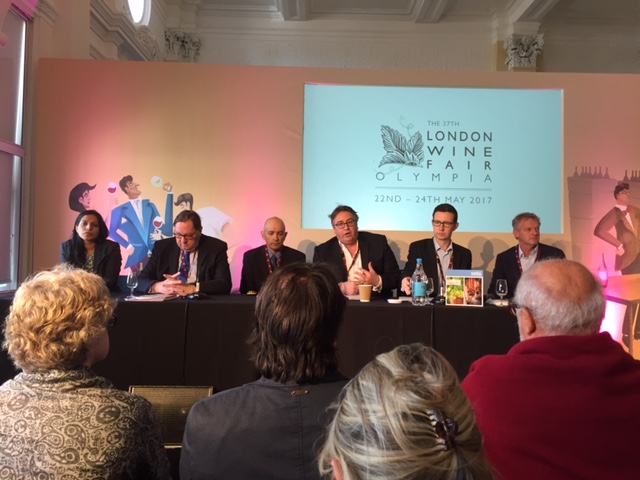
LWF Day One: The big Brexit debate
Breaking down the cloud of uncertainty brought about by Brexit into manageable bite-sized pieces was the objective of panelists at this afternoon’s London Wine Fair industry briefing.
A panel of industry experts from political, economic, legal and business backgrounds framed the general “Brexit debate” hanging over the industry by looking at what can and can’t be predicted, and also by prioritising some of the concerns.
One of the issues widely predicted to cause mass headaches following the referendum has been the effect of trade tariffs on producers exporting to the UK.
But from an economics point of view, Dr Swati Dhingra from the London School of Economics argued that non-tariff barriers such as foreign investment will have the far bigger impact on GDP.
“If we leave the single market and the EU, the impact on tariffs would be between 1% and 3% - probably around 1.5%. But non-tariff barriers, such as a lack of foreign investment, have the much bigger potential to contribute to a reduction of GDP.
“If foreign investment starts to dry up because companies no longer want to use the UK as big export platform, that’s where the big effects come from.
“However, it is more difficult to predict exactly what impact might be. It could be anywhere between 2% and 8% or perhaps more. It depends on how you interpret numbers.”
The effect of such economic uncertainty on the UK’s Spanish partners was highlighted by research carried out by co-panellist Dr Abel D. Alonso, from Liverpool Business School.
Dr Alonso gathered 215 responses from producers at a major wine fair recently in Spain, where the vast majority of respondents had some sort of export relationship with the UK.
“86% of respondents highlighted uncertainty [as a Brexit-related concern],” said Alonso. “49.2% said Brexit would have a negative impact on the Spanish wine industry, while 25.4% said there would be no major changes, and 25.4% said I don’t know.”
Some of the negative impacts on the Spanish wine industry included price increases due to higher import taxes, Spanish wine brands no longer being exported to the UK (as producers look for opportunities elsewhere) and an increased emphasis on non-EU wines.
WSTA chief exec Miles Beale concurred that non-tariff issues have the higher potential for negatively impacting the trade, pointing to the possibility of the restricted movement of goods.
“It’s the admin issues and getting the product from A to B which is going to be the real difficulty. If you take a hard line on customs borders, it’s hard to see how there will be a smooth flow of goods,” he said.
He also referred to the impact of Brexit on tariff agreements with countries within the EU and around the world.
In the best-case scenario, the UK would be able to broker a deal with the EU to maintain its access to the current free trade agreement framework currently enjoyed within the trading block (and also other countries such as Chile, which the EU has negotiated a separate zero tariff agreement.)
However, Theresa May has already outlined intentions to pursue a “hard Brexit”, where the UK is essentially pulled out of the EU in April 2019 - two years after Article 50 was trigged – without the opportunity for such trade arrangements to be made.
In their place, the set of tariffs already negotiated between the EU and the World Trade Organisation would automatically come into effect, meaning that wine coming in from the rest of the world to the UK would follow the following price structure: 8.5p per bottle for 13% ABV or below, 10p per bottle for ABV between 13% and 15%, 21p for sparkling.
These tariffs would be instantly applied to wine coming from the EU and the rest of the world.
However, this is no different to what countries such as Australia already pay when exporting wine to the UK.
Compared to excise duty hikes imposed by our own government, (which are separate to tariffs), the WSTA argues that an additional 10p charged on wine coming to the UK is negligible.
“Yes, tariffs matter but not as much as you might think,” Beale observed.
With the devaluation of the pound coming through in the WSTA’s Quarter 2 market report, compounded by inflation and excise duty hikes, the effects of Brexit are already being felt, Beale told the audience.
The length of time needed to recreate favourable trade agreements with places like Chile will also impact the trade, he said.
“Spirits exports from the UK to the EU are almost the same as the amount of wine coming to the UK from the EU. So it’s entirely rational to reach an agreement that suits all parties. The problem is politicians. We need to make sure that as an industry, politicians know what we want.”
Preventing patterns of trade changing is the WSTA’s priority over the next two years and beyond.
In the meantime, “thousands of statutes” to replace EU law and “thousands of transitional trade deals” will need to be considered, according to law firm representative Guy Harvey and Dr Dhingra respectively.
This could be a blessing as well as a curse, Beale said when was pressed to offer some Brexit silver linings.
“There are opportunities to free ourselves from some of the shackles that come with having to agree things with 27 other countries. But whether they will make up for the lack of the single market, I’m not sure. And those benefits won’t be felt any time soon,” he said.




